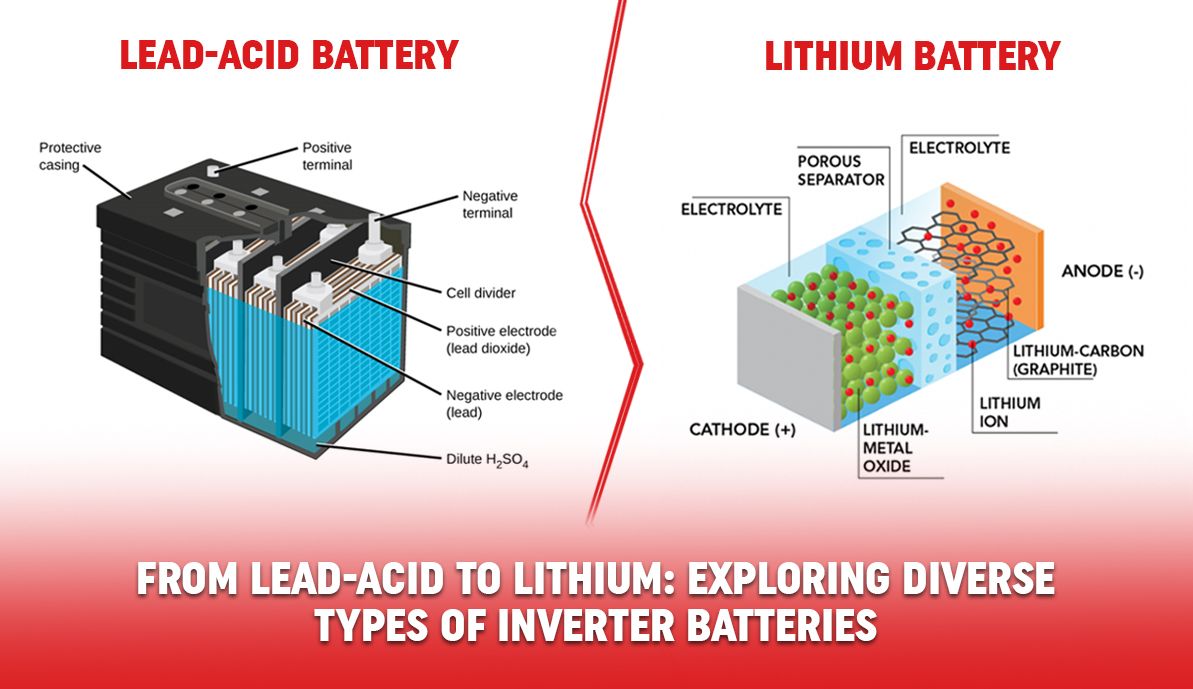
Exploring Diverse Types of Inverter Batteries
Inverter batteries have become an integral part of the life of Nigerians because they provide a reliable source of power for electronic devices and appliances. Nigerians use these batteries in a wide range of applications, including at homes, businesses, and during emergency situations. Nigeria often faces a crisis of electricity and sudden electricity outages. During these times, inverter batteries help a lot in providing an emergency supply of electricity.

One of the core benefits of inverter batteries is that they provide a stable and consistent power supply, even when the primary power source is unstable or unavailable in Nigeria. That is particularly useful for devices that require a constant power supply, such as medical equipment or communication systems.
Another benefit of various types of inverter battery is that Nigerians use these together with a wide range of devices that require Alternating Current (AC) power, such as computers, televisions, and air conditioners. That allows people to use their electronic devices even when there is no main power supply available. The residents use inverter batteries during emergencies, such as power outages or natural disasters. In this blog, we will explore diverse range of inverter batteries, from lead-acid to lithium, as the best power solutions to meet your requirement.
Inverter Batteries- A Savior During Power Outages
One of the main advantages of inverter batteries is their ability to store and provide power during power cuts. That can be notably useful for companies that rely on electricity to operate, as loadshedding issues can cause significant disruptions and lost revenue. Individuals can use inverter batteries to provide power during natural disasters, such as hurricanes and earthquakes, when the primary power source might get down for an extended period of time.
They can deliver a dependable source of power for essential devices, such as lights, phones, and medical equipment, allowing people to continue their daily lives during these difficult times. Inverter batteries have become an essential part of our everyday lives because they provide a reliable source of power for our electronic devices and appliances, and one can use them in a wide range of applications, including residential, commercial, and industrial spaces during emergency situations.
Various Types Of Inverter Batteries
The role of inverter batteries have become indispensable to our lives, ensuring uninterrupted power supply during blackouts. However, not all batteries are alike. The section intends to explore different types of inverter batteries available out there and their unique features, helping you make an informed choice regarding which one is the best fit for your use.
The most common type of inverter battery is lead-acid batteries. People widely use these batteries in renewable energy systems due to their cost efficient feature and long lifespan. They are obtainable in different sizes, as well as capacities, making them a perfect fit for a spectrum of applications.
1. Lead-Acid Inverter Batteries
Lead-acid inverter batteries have been the traditional workhorses of the inverter world. They are affordable and offer reliable performance. Lead-acid batteries require regular maintenance, while sealed lead-acid batteries are maintenance-free. These batteries have a good lifespan but are bulkier and slower to charge.
2. Lithium Inverter Batteries
Lithium inverter batteries have revolutionised the power storage landscape. They are compact, lightweight, and also have a high energy density. These batteries boast a longer lifespan and faster charging capabilities compared to lead-acid batteries. Although they might seem more expensive initially, their efficiency and longevity make them a cost-effective choice in the long run.
3. Gel Inverter Batteries
Gel inverter batteries are batteries that use a gel electrolyte, making them spill-proof and maintenance-free. They offer excellent deep-cycle capabilities and are ideal for frequent power outages. However, they are more expensive than traditional lead-acid inverter batteries.
4. Flow Inverter Batteries
Flow inverter batteries are among the best types of inverter battery that are gaining popularity in the renewable energy sector. These batteries store energy in liquid electrolytes and can be charged and discharged for extended periods. They are ideal for large-scale renewable energy systems and come with a longer lifespan as compared to other types of batteries.
5. Absorbent Glass Mat (AGM) Inverter Batteries
AGM inverter batteries are a lead-acid battery variant that uses a fibreglass mat separator soaked in electrolytes. These batteries are valve-regulated, maintenance-free, and highly resistant to vibration. AGM batteries provide high performance and are suitable for various applications.
Inverter Batteries- Being An Environment-Friendly Solution
Inverter batteries are environmentally friendly, as they do not produce harmful emissions like traditional power generators. This feature makes them ideal for residential and industrial applications committed to sustainability and reducing their carbon footprint. Inverter batteries come in a range of sizes and capacities, making them suitable for a variety of residential and industrial applications. Choosing the correct battery for your particular needs becomes essential, considering factors such as the size of your commercial or residential space, the amount of power you need, and your budget.
Summing Up
Inverter batteries play a critical role in renewable energy systems. By storing excess energy generated by renewable sources, these batteries help to ensure a constant supply of electricity, even during periods of low sunlight or high wind. With the increasing demand for renewable energy, experts expect the use of inverter batteries to grow in the coming years. Choosing the right inverter battery is crucial for an uninterrupted power supply. Understanding the characteristics and differences of various battery types helps you select the best that suits your needs.